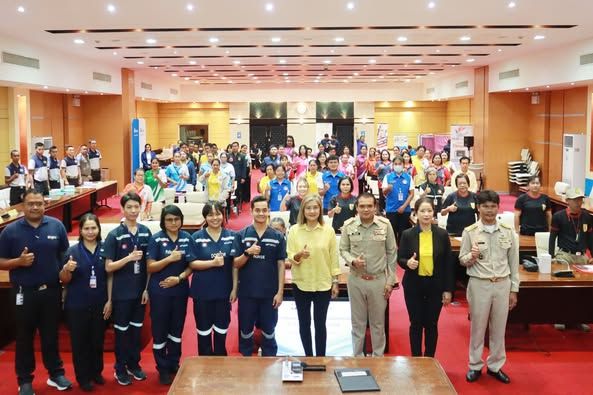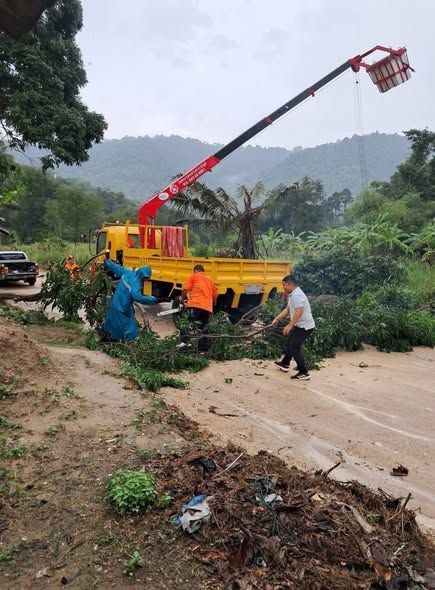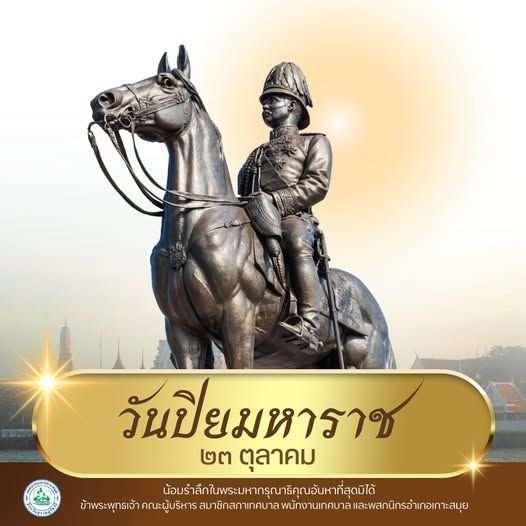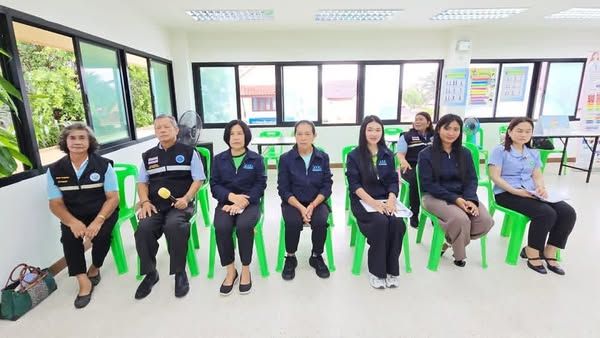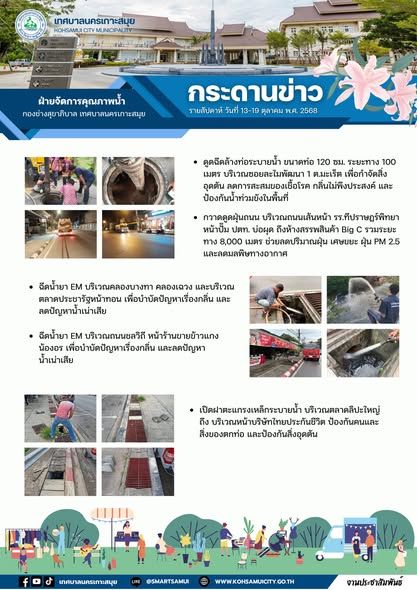Koh Samui’s latest Volunteer Training Project empowers 65 locals with emergency medical skills and tourism information services, led by Bangkok Samui Hospital experts. These dedicated volunteers are now prepared to ensure tourist safety and create unforgettable experiences on the island, thanks to the initiative by Deputy Mayor Supinya Srithongkul.
KohSamuiTourism #CommunityStrength #VolunteerTraining #TravelSafety #ThailandTravel #IslandLife #SustainableTourism #EmergencyResponse #TravelSupport #VisitThailand
The Volunteer Training Project to Assist Tourists, Fiscal Year 2025, Batch 2, marked a significant step in strengthening visitor safety and service standards in Koh Samui. The initiative, officially launched on March 24, 2025, at the Phet Samui Meeting Room in the Koh Samui City Municipality Office, was organized through a partnership between Koh Samui City Municipality and Bangkok Samui Hospital. The project was inaugurated by Ms. Supinya Srithongkul, the Deputy Mayor of Koh Samui City Municipality.
Objectives and Rationale
The project’s primary aim is to enhance the safety and well-being of tourists by equipping local volunteers with practical skills in emergency medical response and tourism information services. Koh Samui is a renowned tourist destination, and the influx of both domestic and international visitors necessitates robust measures to handle emergencies and provide accurate local guidance. By focusing on first aid, basic life support, and the management of non-communicable diseases, the project aligns with broader goals of sustainable tourism development and improved public health.
Training Activities and Curriculum
The training program was carefully designed to address both medical and informational needs relevant to tourism. Activities included:
- Lectures on the Emergency Medical System: Volunteers were introduced to the structure and protocols of emergency medical response in Thailand, ensuring they understand local procedures and how to coordinate with professional responders.
- Basic First Aid and Basic Life Support (BLS): Comprehensive instruction was given on providing immediate care for injuries, cardiac events, and other emergencies until professional help arrives.
- Care and Prevention of Non-Communicable Diseases (NCDs): Given the prevalence of chronic conditions such as diabetes and hypertension, volunteers received guidance on recognizing symptoms, offering assistance, and preventing complications among affected tourists.
- Hands-on Use of Medical Equipment: Participants practiced using Automated External Defibrillators (AEDs) and other essential medical tools, reinforcing their confidence and competence in real-life emergencies.
- Tourism Information Services: Volunteers were also educated on delivering accurate, helpful information to tourists, from directions to cultural etiquette tips, to enhance the visitor experience and safety.
Expert Instructors and Collaborative Approach
Expert speakers from Bangkok Samui Hospital led the sessions, including:
- Dr. Sirapat Viboonlaksanakul, Emergency Medicine Physician
- Nurse Wildan Sama, Accident and Emergency Department
- Nurse Arthit Kattiyasan, Accident and Emergency Department
- Ms. Phusadee Phet-hub, Assistant Nurse/EMT, Accident and Emergency Department
- Mr. Nantapong Sen-thongkaew, EMT
Their involvement ensured the training adhered to the latest medical standards and best practices.
Target Participants and Community Involvement
A total of 65 participants were selected for this batch, representing a cross-section of the local community:
- Village health volunteers
- Civil defense volunteers
- Local government agency representatives
- Tourism business operators
- General public members
This diverse group was chosen to ensure comprehensive coverage across areas frequented by tourists and to foster a community-wide culture of safety and hospitality.
Inter-Agency Collaboration and Support
The project was the result of extensive cooperation between medical professionals from Bangkok Samui Hospital, the Koh Samui City Municipality staff, and representatives from both public and private sectors. Such collaboration is vital for developing an efficient response network, which not only assists tourists in emergencies but also boosts the island’s reputation as a safe and welcoming destination.
Supporting Sustainable Tourism Development
By investing in volunteer training and creating a structured safety net, Koh Samui is taking proactive steps to support sustainable tourism. Well-prepared volunteers enhance visitor confidence, encourage repeat tourism, and contribute to the overall quality of life for both locals and guests.
Access to Program Highlights
For those interested in viewing highlights and photos from the training activities, additional media is available online at this link.
Frequently Asked Questions
“`markdown
FAQ: Volunteer Training Project to Assist Tourists in Koh Samui
What is the main goal of the Volunteer Training Project on Koh Samui?
The project aims to enhance tourist safety and well-being by equipping 65 local volunteers with practical emergency medical skills and tourism information services. By preparing volunteers for first aid, basic life support, and effective communication with visitors, Koh Samui strengthens its reputation as a safe, welcoming destination and supports sustainable tourism.
Who organized and conducts the training, and who are the participants?
The training is a collaborative effort between Koh Samui City Municipality and Bangkok Samui Hospital, led by experts in emergency medicine and public health. Participants include a diverse group of village health volunteers, civil defense volunteers, local officials, tourism business operators, and general community members—ensuring comprehensive coverage in areas most frequented by tourists.
What specific skills and knowledge do volunteers gain from this training?
Volunteers receive comprehensive instruction in emergency response, including:
– Emergency medical system protocols and coordination,
– Basic first aid and life support (BLS),
– Recognition and management of non-communicable diseases (NCDs),
– Hands-on training with Automated External Defibrillators (AEDs) and other medical equipment,
– Providing accurate tourism information and visitor support.
This well-rounded curriculum ensures volunteers can effectively assist in medical emergencies and improve the overall tourist experience on the island.
“`
